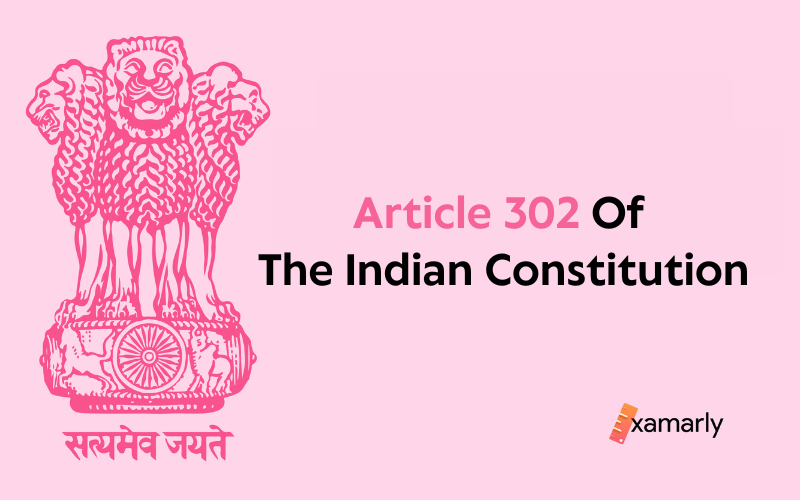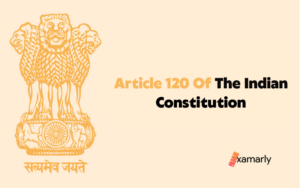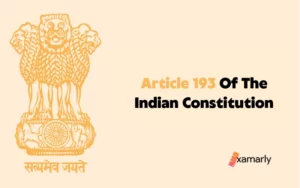Article 302 of the Indian Constitution talks about the power of the Parliament to impose limits on trade, commerce, and intercourse.
It is necessary to focus on several key aspects in the context of Article 302 of the Indian Constitution is necessary before delving into Article 302 in detail.
- What exactly is a "Trade"?
- Commerce – Well Defined
- Intercourse
- Article 302 Of The Indian Constitution – In Detail
- The authority of Parliament to oversee and control commercial activity in the public interest
- Some Landmark Judgements Related To Article 302 Of The Indian Constitution
- Summing Up
- FAQs on Article 302 Of The Indian Constitution
- Where can I find the primary statute that governs commercial liberty in India?
- In India, is it possible for the government to limit trade and business?
- In India, is it legal for the government to show favouritism toward certain kinds of business or commerce?
- Are international businesses allowed to participate in trade and commerce in India?
- Is there anything that restricts people's ability to engage in free trade and business in India?
What exactly is a “Trade”?
The act of buying and selling goods for the purpose of making a profit is referred to as “trade.” In Article 301, the term “trade” refers to an action that is actual, organised, and organised with the intention of achieving a certain purpose. In the context of Article 302, the terms “business” and “trade” are synonymous and refer to the same thing.
Commerce – Well Defined
The phrase “commerce” refers to the transmission or movement of goods or information by any means of communication, including the air, sea, telephone, or telegraph. According to Article 302, what is necessary for the conduct of commercial activity is not gain or profit but rather transit or transmission.
Intercourse
The term refers to the process of moving items from one location to another. It encompasses transactions and movements that are either commercial or non-commercial in nature. It would include any and all sorts of interaction with other people, including travel. On the other hand, there are many who believe that the freedom that is protected in Article 301 does not extend to intercourse in its most general sense.
This is true for two different reasons. To begin, the word “intercourse” is employed in conjunction with the terms “trade and commerce,” and as a result, this phrase will signify “commercial-intercourse” rather than aimless mobility in this context.
The second reason is that even though Article 301 places a restriction on the power of the legislature and parliament (which is provided to them under Articles 245 and 246), the word “intercourse” is not included as a subject of legislation under the Seventh Schedule (like the words “trade” and “commerce”), and so it cannot be implied that the word “intercourse” has the broadest possible meaning when it is used in this context.
The term “free” is used in Article 301, however this does not indicate that people are exempt from the laws and regulations that govern the nation. There is a significant difference between laws that restrict freedom and laws that include rules and regulations for the appropriate execution of commercial activity in a way that is straightforward and streamlined. Both categories of laws have their place in society.
Article 302 Of The Indian Constitution – In Detail
“Parliament may by law impose such restrictions on the freedom of trade, commerce or intercourse between one State and another or within any part of the territory of India as may be required in the public interest.”
This article is part of Part XIII of the Constitution, which deals with “Trade and Commerce Within the Territory of India.” It gives Parliament the power to limit trade, commerce, and interactions between different states in India or within any part of the country if it is thought to be in the public interest. These restrictions must be imposed by law and must not be discriminatory.
Article 302 is related to Article 301, which guarantees the freedom of trade, commerce, and intercourse within the territory of India. Article 302 allows Parliament to impose reasonable restrictions on this freedom if it is necessary in the public interest.
The authority of Parliament to oversee and control commercial activity in the public interest
Article 302 of the Constitution of India gives the Parliament the authority to impose limits on the freedom of trade, commerce, or interstate contact that is carried out inside a state or beyond state lines anywhere in the territory of India. These restrictions can be placed within a state or beyond state lines.
These restraints may only be applied after taking into account the legitimate concerns of the general public. Parliament is the only body that has the authority to determine whether or not a certain action or policy is in the public’s best interest.
It may be noted as in the case of Surajmal Roopchand and Co. vs. the State of Rajasthan (1967), when restrictions were placed on the transportation of grain in order to protect the general public’s health and safety. The Defence of India Rules mandated the implementation of these stipulations, thus they could not be broken.
Some Landmark Judgements Related To Article 302 Of The Indian Constitution
The case involving the Atiabari Tea Company vs the State of Assam (1961)
Facts
In the case of Atiabari Tea Co., Ltd. vs. the State of Assam, the Assam Taxation Act imposes a charge on goods transported by road or inland waterway. The petitioner in the current case operated a company that included shipping tea from Assam to Calcutta (which is now known as Kolkata). Now, in accordance with the aforementioned Act, the tea was subject to taxation whenever it traveled through Assam with the intention of arriving in Calcutta.
Issues
The logic of passing the Assam Taxation Act of 1954 was called into doubt due to the following reasons:
whether or whether it goes against the provisions of Article 301.
whether or not it could be protected if it were to come within the purview of Article 304(b), or whether or not it already does.
Judgment
The Supreme Court said that the law in question without a doubt imposed a tax that directly and immediately stopped goods from moving.
As a consequence of this, the statute comes within the purview of Article 301 since it interfered with the free circulation of products.
The Supreme Court went on to clarify that these taxes can only be levied after fulfilling the conditions of Article 304(b), which states that the sanction by the President is required before any State enacts such a law. The Supreme Court went on to say that these taxes can only be levied after fulfilling the conditions of Article 304(b).
The Supreme Court went on to say that these taxes can only be levied after fulfilling the conditions of Article 304(b).
In addition, the Supreme Court stated that these taxes can only be levied after the conditions of Article 304(b) have been met. In this particular instance, the standards outlined in Article 304(b) were not satisfied.
If the transmission of commodities is impeded without satisfying the standards set forth by Article 302 through Article 304 of the Constitution, then the freedom that is guaranteed by Article 301 will cease to exist or will be made up in one’s mind.
Summing Up
We can conclude from Article 302 of the Indian Constitution that it pertains to the power of the Union (central government) to impose, alter, or repeal taxes on the sale or purchase of goods and services.
FAQs on Article 302 Of The Indian Constitution
Where can I find the primary statute that governs commercial liberty in India?
Article 301 of India’s Constitution is the main piece of law that says who can do business in India and who can’t. This article guarantees the freedom of trade, commerce, and interaction within India, as long as the government doesn’t put unreasonable limits on it for the safety of the general public. However, these restrictions may only be imposed by the government.
In India, is it possible for the government to limit trade and business?
The government of India has the authority to and does have the ability to, place reasonable limits on commercial activity in the country for the purpose of safeguarding the interests of the general public. These constraints have to make sense, and they can’t single out certain groups of people.
In India, is it legal for the government to show favouritism toward certain kinds of business or commerce?
It is not permissible for the government in India to show favouritism or hostility against any one specific sector of the economy, including the commercial sector. The government is not allowed to impose any kind of barrier on trade or commerce according to Article 301 of the Constitution since this would be considered discriminatory.
Are international businesses allowed to participate in trade and commerce in India?
Yes, international businesses are permitted to participate in trade and business activities inside the borders of India. However, they are obligated to behave in a manner that is consistent with all applicable rules and regulations, including those concerning taxes, international trade, and the conduct of business.
Is there anything that restricts people’s ability to engage in free trade and business in India?
Yes, trade and business in India are free, but the government can put reasonable limits on it to make sure the safety of its people as a whole. These restrictions are intended to keep the public safe. These constraints have to make sense, and they can’t single out certain groups of people. When doing business in India, companies based outside of the country must follow all of the country’s laws and rules.






